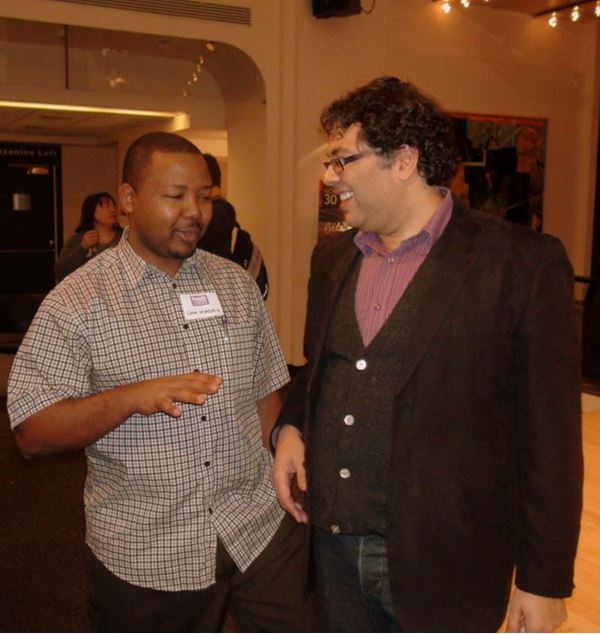How do I Think?
It is our thinking that builds our personalities, character, motivation, and yes our understanding of the world and how we either fit in or change it. After many years of training and thinking, I have come to a self realization that I was not created to fit in this world but rather to change it. As I begin to share with you my philosophies of education, it is perhaps fair to first share one of the strongest statements that changed my thinking patterns.
“I’ve spent my life trying to undo habits—especially habits of thinking. They narrow your interaction with the world. They’re the phrases that come easily to your mind, like: ‘I know what I think,’ or ‘I know what I like,’ or ‘I know what’s going to happen today.’ If you just replace ‘know’ with ‘don’t know,’ then you start to move into the unknown. And that’s where the interesting stuff happens.” — Humans of New York
it is not very surprising to me that most of the professors during my graduate education told me that they don’t know, but that together we’ll find out. on the contrary, most of my teachers throughout my undergraduate schooling assured us that they had gone to school and knew exactly what they were talking about. The differences in the educators above constantly reminds me about what my father told me when I was growing up. he said “son, when you carry change or coins in your pocket, it will always make a lot of noise, but when you carry a bundle of paper money, it will stay quite in your pocket.” Whenever, I facilitated the advocacy and citizen engagement course at the Coady Institute, I always checked the worlds democracy indexes by country and there always one surprise in my findings. I always found that countries that insert the word ‘democratic’ in their legal name, had disastrous democracy rating worldwide. Every-time I checked, I never found any democracy in the Democratic Republic of Congo, Democratic People’s Republic of Korea, People’s Democratic Republic of Algeria, and so on. For a long time now, I have been challenged to think deeply of who I’m and how other people might think of me when I define and present myself as an educator.
Throughout my life, I have learned that poor initial decisions are one of the reasons we’re so busy. With poor thinking, a large chunk of your time is spent correcting mistakes. Good thinking, on the other hand, produces better initial decisions and frees up time and energy. I have learned that my first thought is never my best thought and that continuously thinking about my thoughts adds significant value before conclusions are made.
It’s only by concentrating, sticking to the question, being patient, letting all the parts of my mind come into play, that I arrive at an original idea. By giving my brain a chance to make associations, draw connections, take me by surprise. And often even that idea doesn’t turn out to be very good. I need time to think about it, too, to make mistakes and recognize them, to make false starts and correct them, to outlast my impulses, to defeat my desire to declare the job done and move on to the next thing. — William Deresiewicz
I want to believe that I’m an abstract thinker who always wants to see the big picture before narrowing it down to the now and finally making any conclusions. I have been involved in a handful of community advocacy campaigns when the masses decide to go for protests without any clear plans. Usually I refuse to just go because I then begin to ask myself questions such as where are we going, what exactly do we want, who exactly are we facing and why, how are we getting there, what support do we have, who is with us and who is against us, and so many others. I feel the energy and confidence flowing over my body when the above questions are answered. I’m fully aware of those who critique this thinking style arguing that it is time wasting. However, I’m also aware that it is usually cost effective to organize a few sessions of planning than not planning at all and having to face the costs of fixing mistakes or rather doing damage control. I like to read between the lines and look for deeper meanings or the underlying patterns in things.
Looking back throughout my life as a teacher, student, educator and facilitator, I have every reason to believe that I’m a Creative thinker who prefers to get rid of the box and think not just outside the box, but without the box completely. In my opinion, the box creates parameters around which I should think thereby limiting my thinking horizons. I like to break away from the ‘box’ and other traditions and norms of society when it comes to new ideas and ways of thinking. I believe that everything great today started as a strange idea and was perhaps opposed and laughed at. I strongly believe in ordinary people doing extraordinary things. The greatest businesses on earth were started by ordinarily people whose thinking and ideas were out of the ordinary. I’m usually pleased when my ideas and thoughts are challenged by other thinkers. As a teacher, my most boring class is when my students agree with some of my thoughts and ideas without debate. I’m always looking for different perspectives of my thoughts and ideas. As a creative thinker, I always try to think differently from what I think everybody else is thinking about. During my graduate studies at St. Francis Xavier University, I developed an ‘E3MW Different Perspectives Tool’ that helps my learners to understand that sometimes there are multiple approaches, perspectives or answers that are all right. The tool can also be used in conflict resolution because most conflicts and misunderstandings are caused by people holding fixed positions or fixated frames of analysis.
I usually catch myself in the act of carefully listening to my thoughts over and over in an attempt to make connections and identify gaps. I tend to develop a careful critical evaluation or judgment of my thoughts in order to determine the authenticity, accuracy, worth, validity, or value of something. I think I’m as well a critical thinker who enjoys exploring other elements that could have an influence on my conclusions. I agree to the old English saying that ‘think twice before you act. I have sometimes criticized myself for being slow to act because I still need to find answers to the gaps I identify in my thinking. Deeper reflections are prerequisite to my actions. It is not uncommon for me to pause during my actions and try to critically think about what I’m doing and when I finish a task, I always try to bring my maid back to that task and evaluatively think about what went well and what I could have done differently. I find this cycle of thinking and action very helpful because then I make less mistakes. It never matters what class I teach, I always strongly advise my students to think-in-action and reflect-on-action.
I have now started to believe in my thinking that the best way to improve my ability to think effectively and strategically, is to spend time thinking.
introduction
Talk to me for help
I help global learners with their ambition’s most critical issues and opportunities. Together, we create enduring change and results.

career
Find your will now
I help global scholars with their organization’s most critical issues and opportunities. Together, we create enduring change and results.


